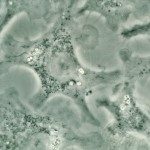Lien vers Pubmed [PMID] – 15530505
Life Sci. 2004 Dec;76(4):429-43
In the present work, we tested the hypothesis that serotonin (5-hydroxytryptamine = 5-HT) might activate the extracellular signal-regulated kinase (ERK) pathway in human peripheral blood mononuclear cells (PBMC). PBMC were maintained in culture for 72 hrs at 37 degrees C prior to the addition of 5-HT. Our results showed an increase in ERK activation by 5-HT with a peak effect at 30 min and maximal stimulation with 5-HT at 1microM. This activation of ERK did not occur in adherent monocytes suggesting that the effect was on lymphocytes. In addition, p38 MAP kinase was not activated under these conditions. The effect of 5-HT on ERK activation appeared to be mediated through the activation of 5-HT1A receptors since similar results were obtained with R-+-8-hydroxy-DPAT, a selective 5-HT1A receptor agonist and WAY100635, a selective 5-HT1A receptor antagonist, reversed the 5-HT and the R-+-8-hydroxy-DPAT effects. Results from Western blot analysis confirmed the presence of 5-HT1A receptors on the PBMC. A 5-HT2A antagonist, ketanserin, and a 5-HT transport inhibitor, fluoxetine, both failed to block the activation of ERK by 5-HT. Our results indicate that 5-HT activates ERK, but not p38, MAP kinase of human PBMC via a 5-HT1A receptor.





